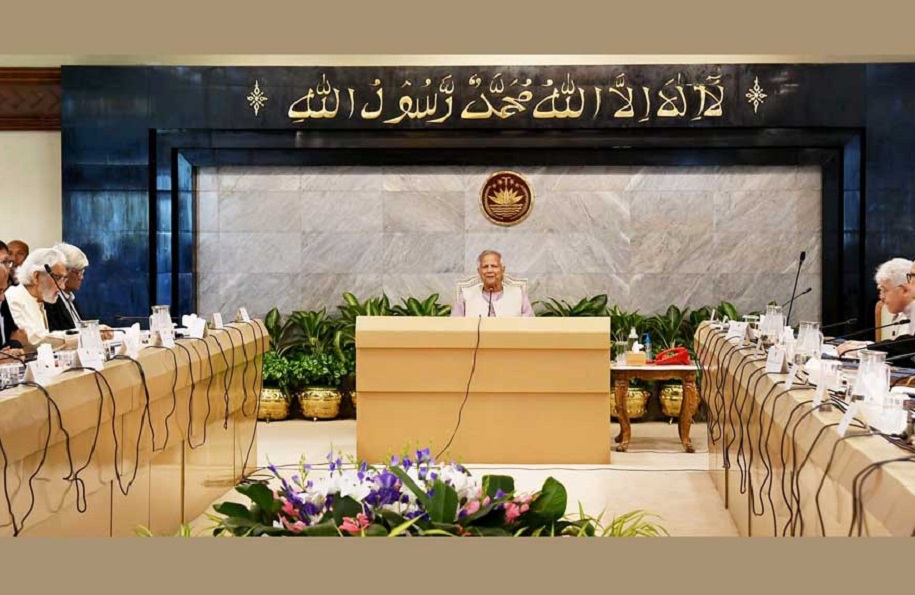'All acts of interim government legal', term unspecified: Ordinance in the works


A draft ordinance giving legal validity to all actions of the interim government has received provisional approval.
The ordinance specifies that the caretaker administration will remain in power until a new prime minister is appointed by the 13th Parliament, with no fixed term outlined, reports bdnews24.com.
According to the draft, court or authority, including the Supreme Court of Bangladesh, can question the validity of any action taken by the government.
It further specifies that no lawsuits can be filed regarding these actions.
The draft ordinance, titled 'Interim Government Ordinance, 2024', has been prepared with a legal foundation for the exercise of executive powers, declaration of a state of emergency, and other related matters, based on the advice of the chief advisor.
On Sept 19, the interim government, led by Muhammad Yunus, granted both provisional and final approval to the draft ordinance, which is now awaiting gazette publication.
Cabinet Secretary Sheikh Abdur Rashid said on Friday, "The interim government's term will remain effective until the next elected government assumes office. Once the ordinance is issued, further details will be disclosed.”
He added, "The draft has been prepared after considering various factors, and the law advisor is currently abroad. We will discuss further when the advisor returns."
After Sheikh Hasina resigned and fled to India on Aug 5, an interim government was formed three days later.
Parliament was dissolved shortly before the caretaker administration took office.
The term of this government remains unspecified, and no clear indication has been given regarding its duration.
The government has mentioned reforms in different areas, including constitutional reforms.
According to the Constitution, elections must occur within 90 days after the parliament is dissolved. If this is not feasible, an extension of an additional 90 days is permissible.
Army chief Gen Waker-Uz-Zaman said in a foreign news outlet that elections may take place within 18 months, but the government dismissed this as his personal opinion.
Law Advisor Asif Nazrul said elections could be held at the end of 2025, though Religious Affairs Advisor AFM Khalid Hossain clarified that this was not an official government statement.
Bangladesh’s major political party, BNP, has already called for an early election, arguing that decisions on constitutional amendments should be made by an elected parliament for lasting stability.
Another political party, Jamaat-e-Islami, initially took a position of "reforms first, elections later," but is now calling for "quick reforms and immediate elections."
ALL ACTIONS ‘VALID’, NO OPTION TO GO TO COURT
The proposed ordinance regarding the "legality of acts and activities of the interim government" specifies that, despite any provisions in the Constitution or other laws currently in force, all powers exercised by the interim government, as well as any ordinances, regulations, notifications, orders, actions, and measures taken by the government between the formation of the new parliament and the appointment of the prime minister, will be deemed legally proper and valid.
No questions can be raised regarding the legitimacy of these actions in the Supreme Court or any other court or authority, and they cannot be declared illegal or annulled.
The section related to 'maintenance of the interim government's formation and functions' adds that even if there are errors regarding the formation of the interim government or the appointment of the chief advisor or any advisors, such issues will not render any actions invalid, and no questions or lawsuits can be filed in any court about this.
The ordinance outlines the application of executive powers, the consultation of the chief advisor, the government's term, and its status.
• The chief advisor will appoint as many advisors as deemed necessary.
• The president will administer the oath of office to the chief advisor and other advisors.
• The interim government will assist the Election Commission in holding a free, fair, and impartial election.
• The chief advisor will have the rank and privileges of the prime minister, and the advisors will have the rank, salary, and benefits of ministers.
• The chief advisor and advisors may resign by submitting a written and signed letter to the president.
• If the position of chief advisor becomes vacant due to resignation, death, or other reasons, the president can appoint an advisor as the new chief advisor.
• Regarding the consultation with the chief advisor, irrespective of other existing laws, the president will act upon the advice of the chief advisor during the tenure of the interim government. Before declaring a state of emergency, the president must obtain the chief advisor's countersignature.


 For all latest news, follow The Financial Express Google News channel.
For all latest news, follow The Financial Express Google News channel.